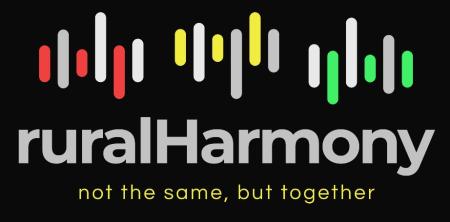
ruralHarmony
Mission

This group is organized for the express purpose of developing and pursuing a collaborative and complementary program of research exploring health risk and interventions among rural lesbian, gay, bisexual, transgender, queer and other identities (LGBTQ+). While explicitly addressing LGBTQ+ individuals and populations, it is also meant to accommodate and include other marginalized populations. The program is based upon the ideas that all people are deserving of respect for who they are as they are, and that everyone should be considered for their whole personhood and not solely on one aspect (e.g. sexual orientation; substance use).
Background + Goals
The ruralHarmony program was started in 2021 to fill the void of research addressing health conditions (such as STI risk, cancer screening, etc.) among LGBTQ+ individuals in rural areas. Using a participatory approach rooted in community engagement, the infrastructure of ruralHarmony has provided an opportunity to examine and influence the health and well-being of LGBTQ+ individuals across central and southern Illinois. Previously funded projects, such as the 2021 ruralHarmony survey and the 2022 cohort, and our current E-Resilience Pilot Study have engaged a diverse group of individuals across the region and multiple community and academic partners.
The initial goal of the program is to better understand the health and well-being of rural people, especially those identifying as part of the LGBTQ+ community. A developing goal is to use the information collected to inform best practices and potential interventions to increase the quality of life, health care access and utilization, and to develop an online community hoping to address isolation due to rurality. Beyond this, we aim to support community-led health research, programming, and events across the region.

ruralHarmony Community Advisory Board
The ruralHarmony Community Advisory Board is made up of LGBTQ+ individuals from throughout central and southern Illinois who meet quarterly to provide guidance and support. They also assist with the dissemination of ruralHarmony materials and program information.
Websites
Projects
i. Engaging rural lesbian, transgender, and bisexual individuals in cervical cancer screening
(E-Resilience); Simmons Cancer Institute – Team Science Grant (1 Jul 2023-30 Jun 2025)
- Investigators: WD Jenkins, P Bhandari, MJ Lee, KW Miller
- Specific Aims/Summary
Currently in development. Please check back soon for updates.
i. Increasing Lung Cancer Screening Awareness in the LGBTQ+ Population with the Use of Artificial Intelligence
- 2-year project to assess lung cancer screening differences between rural and urban LGBTQ+ people; and to develop an artificial intelligence powered conversational agent to assess eligibility for screening and provide education. Resubmitted to American Cancer Society April 2024
- S Olivo-Marston (PI), S Thuppal, KW Miller, T Thompson, A Spenner, T Crabtree
ii. Rainbow Lungs: Increasing lung cancer screening awareness/intent in a LGBTQ+ population
- 1 year project to assess lung cancer screening awareness among rural LGBTQ+ individuals in Illinois submitted to Prevent Cancer Foundation in July 2023
- S Olivo-Marston (PI), KW Miller
iii. The Reducing HIV/HCV/STI and other infectious disease transmission behaviors and risks among Rural Bisexual plus people who use drugs
- (RuBi Project) is a 4-year R01 submitted to the NIH/NIDA in June 2023.
- Investigators: WD Jenkins, L Beach, C Brenham, J Rose, C Dunkley, KW Miller, G Luckey, and MT Pho
- Specific Aims/Summary
Currently in development. Please check back soon for updates.
i. The 2021 Survey was a cross sectional survey of individuals across southern IL. Funded by a grant from Blue Cross/Blue Shield of Illinois, this survey collected data from 398 individuals (110 cisgender heterosexual and 288 LGBTQ+).
- Project Dates: May - August 2020
- Investigators: WD Jenkins
- Specific Aims/Summary
ii. The 2022 Cohort was a longitudinal cohort of LGBTQ+ individuals across central and southern IL. Funded by a grant from Blue Cross/Blue Shield of Illinois, this cohort of 85 individuals completed three surveys and one interview.
- Project Dates: January - December 2022
- Investigators: WD Jenkins, KW Miller
- Specific Aims/Summary
Engagement
Education
Transgender Health and Healthcare (Year 4 Elective)
In development. Please check back soon for updates.
Results
Notable
i. Jenkins WD, Miller KW, Tillewein H, Walters S, Weatherly T, Wickham H, Luckey G, Fenner E. Healthcare experiences and health outcomes among rural LGBTQ+ individuals. Amer J Health Prom [in press].
ii. Jenkins WD, Friedman SR, Hurt CB, Korthuis PT, Feinberg J, Del Toro-Mejias LM, Walters S, Seal DW, Fredericksen RJ, Westergaard R, Miller WC, Go VF, Schneider J, Giurcanu M. Variation in HIV Transmission Behaviors Among People Who Use Drugs in Rural US Communities. JAMA Netw Open. 2023 Aug 1;6(8):e2330225.
Past Year
i. Jenkins WD, Phillips G 2nd, Rodriguez CA, White M, Agosto S, Luckey GS. Behaviors associated with HIV transmission risk among rural sexual and gender minority and majority residents. AIDS Care. 2023 Oct;35(10):1452-1464.
ii. Jenkins WD, Walters S, Phillips G, Green K, Fenner E, Bolinski R, Spenner A, Luckey G. Stigma, mental health, and healthcare use among rural sexual and gender minority individuals. Health Education and Behavior. 2022 Aug 29.
For a full list of publications, click here.
Notable
i. Jenkins WD. Variation in HIV transmission behaviors among people who use drugs in rural US communities-- An analysis of data from the Rural Opioid Initiative. Invited presentation to New Your University Langone Health. Department of Population Health. Center for Opioid Epidemiology & Policy; New York, NY; 9 Jan 2024.
ii. Miller KW, Jenkins W, Bolinski R, Mazna F, Velten L. Adverse childhood experience (ACE) exposure among rural, LGBTQ+ individuals: Results from the Illinois Cohort Study. Presented at: IAPHS Annual Meeting, Baltimore, MD, October 2-5, 2023.
Past Year
i. Jenkins WD, Miller K, Tillewein H, Walters S, Weatherly T, Wickham H, Luckey G, Fenner E. Healthcare experiences and satisfaction among rural LGBTQ+ individuals. Presented at: IAPHS Annual Meeting, Baltimore, MD, October 2-5, 2023.
ii. Jenkins WD, Lee M, Miller K, Thompson T, Elgee M, Spenner A. Cancer risk, screening and healthcare engagement among rural LGBTQ+ individuals: preliminary data and opportunities. Presented at: Addressing Policy and Structural Barriers to Improve Rural Cancer Health Conference (NIH-sponsored); 11-12 Aug 2022; St. Louis, MO.
For a full list of publications, click here.
i. Jenkins WD, Choudhary V, Fogleman A, Miller KW, Bhandari P, Lee MJ. Disparities in cervical cancer screening among rural LGBTQ+ individuals. SIUSOM-PSP Policy Series. 2024 (1);1-10.
Request more information
For more information, please email us or follow our ruralHarmony Facebook for updates.





